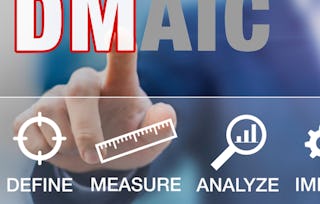This course is for you if you are looking to learn more about Six Sigma or refresh your knowledge of the basic components of Six Sigma and Lean. Six Sigma skills are widely sought by employers both nationally and internationally. These skills have been proven to help improve business processes and performance. This course will cover the Define phase and introduce you to the Measure phase of the DMAIC (Define, Measure, Analyze, Improve, and Control) process. You will learn about Six Sigma project development and implementation, you will become familiar with project management tools, you will be introduced to statistics and understand its significance to Six Sigma, and finally you will learn about data collection and its importance to an organization.

Six Sigma Tools for Define and Measure
Seize the savings! Get 40% off 3 months of Coursera Plus and full access to thousands of courses.

Six Sigma Tools for Define and Measure
This course is part of Six Sigma Yellow Belt Specialization



Instructors: David Cook, PhD
69,728 already enrolled
Included with
2,600 reviews
Skills you'll gain
Details to know

Add to your LinkedIn profile
See how employees at top companies are mastering in-demand skills

Build your subject-matter expertise
- Learn new concepts from industry experts
- Gain a foundational understanding of a subject or tool
- Develop job-relevant skills with hands-on projects
- Earn a shareable career certificate

There are 4 modules in this course
Earn a career certificate
Add this credential to your LinkedIn profile, resume, or CV. Share it on social media and in your performance review.
Instructors

Offered by
Explore more from Business Essentials
 Status: Free Trial
Status: Free TrialKennesaw State University
 Status: Free Trial
Status: Free TrialKennesaw State University
 Status: Free Trial
Status: Free TrialKennesaw State University
 Status: Free Trial
Status: Free TrialKennesaw State University
Why people choose Coursera for their career

Felipe M.

Jennifer J.

Larry W.

Chaitanya A.
Learner reviews
- 5 stars
70.46%
- 4 stars
23.11%
- 3 stars
4.57%
- 2 stars
1%
- 1 star
0.84%
Showing 3 of 2600
Reviewed on May 27, 2020
Courses really help me to understand easily and in a more precise manner, it cover all necessary information about the tool which is going to use.
Reviewed on Aug 29, 2020
Useful and interesting topics, well explained and structured. I give four stars because I would have liked a higher level of insight and some additional practical example.
Reviewed on Sep 18, 2024
This was really informative and interesting. I was able to finish this without any circumstances because the arrangement of the course modules and quizzes. It was really fun learning here.

Open new doors with Coursera Plus
Unlimited access to 10,000+ world-class courses, hands-on projects, and job-ready certificate programs - all included in your subscription
Advance your career with an online degree
Earn a degree from world-class universities - 100% online
Join over 3,400 global companies that choose Coursera for Business
Upskill your employees to excel in the digital economy
¹ Some assignments in this course are AI-graded. For these assignments, your data will be used in accordance with Coursera's Privacy Notice.


